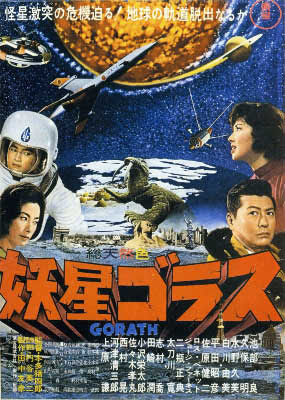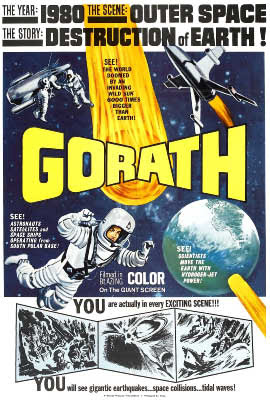This is brought to us from
the same men at Toho who were also responsible for all the Kaiju films in
our life with Ishirô Honda at the helm and Eiji Tsuburaya creating
the special effects. In this one though there are no giant monsters (well,
with the exception of one that feels tagged on at the end for no reason)
menacing earth but don't worry there is still plenty of destruction and Tokyo
as usual gets the brunt of it. Earth is on a collision course with a gigantic
planet/star named Gorath. It is basically gobbling up anything in its path
and increasing its size and mass. And earth has only a short time to figure
out how to avoid disaster. The end of the earth is nigh. I sometimes wonder
what I would do if I knew earth only had a few months to exist. Would I finish
the Dr. Kildare series? Would his antics still be important to me? Would
I calmly review them knowing the earth would blow up soon? What I would like
mankind to do is load a spaceship with all our books, movies, music and of
course my web site and send it out into space to be discovered a thousand
years from now. Because honestly the only thing really worth saving is our
art.
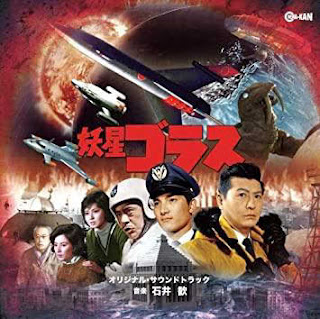
So Gorath is making its tenacious way to earth like a space serial killer
with no remorse. A Japanese spaceship is sent out to observe it headed by
Captain Sonada (Jun Tazaki) but they get too close and the gravitational
pull hurtles them towards death. Before they do though the crew give a big
cheer. Back on earth the different countries are trying to work together
- this was before Republicans were the America First Party - but it is Dr.
Tazawa (Ryô Ikebe) that leads the effort. His plan is simple. Move
the earth out of its way. Just build a vast array of powerful thrusters at
the South Pole and push. This is where I expected Godzilla to show up and
help but instead there is a giant walrus and it does nothing much.
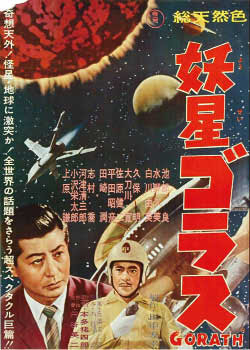
The film is rather stiff and impersonal - none of the characters have much
personality beyond their role as astronaut (Akira Kubo), scientist, girlfriend
(Yumi Shirakawa - The Mysterians, H-Man, Rodan) and the luscious Kumi Mizuno)
and much of the plot seems pointless - the astronauts accomplish nothing
really. But I really enjoyed this for the lovely designs and the fabulous
modeling. The look of the film is wonderful from the bright colors to the
space suits and their white helmets - but the team that worked on the models
get special kudos. There is so much of it - the space ships, the construction
of the base to move the earth, all the helicopters and planes flying and
of course Tokyo getting its ass kicked by huge waves. I love this stuff.
You can tell they are models but that just makes it cooler.
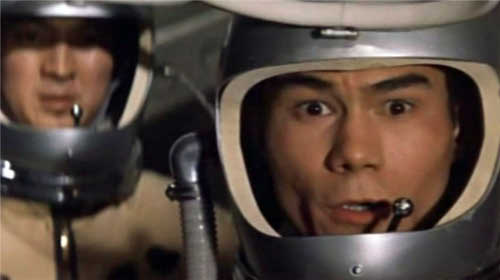
This was Ishirô Honda's third go at a space movie after The Mysterians
(1957) and Battle in Outer Space (1959) which has a similar theme to this
one - the world uniting but in that case to fight aliens invading earth.
The amazing thing about Honda's resume around this same time is just how
productive he was. Not only was he directing the Kaiju and space films as
well as sci-fi films like H-Man, Atragon and Matango but also a number of
what look to be period dramas and comedies. Between Godzilla and Rodan he
directed a film titled Be Happy, These Two Lovers. Between The Mysterians
and H-Man a film named Song for a Bride. Between Mothra and Gorath he directed
a Yakuza film called Shinku no otoko. I don't know if many of these are available
but a few were on that Internet Archive website because I downloaded them
- Come Marry Me (1966), The Blue Pearl (1951) and The Skin of the South (1952).
By 1962 Honda made only fantasy films for the rest of the 1960s with the
exception of Come Marry Me. He was incredible.

There was an American release of this back in 1964 that was dubbed and drastically
edited - the Walrus scenes were deleted which was of course the inspiration
for Lennon's angry protest song - I am the egg man, They are the egg men,
I am the walrus, Goo goo g'joob. By all accounts it was terrible and in the
American poster you would be hard pressed to realize it was a Japanese film.
